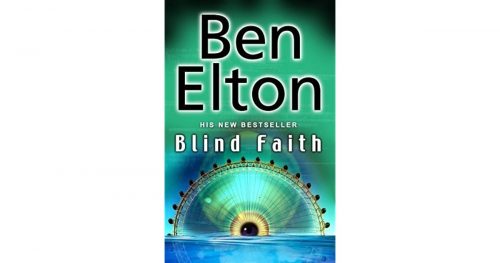
Imagine a world where ‘sharing’ is valued above all and privacy is considered a dangerous perversion.
Such is the world Elton evokes in his 2007 tale of a world that’s exiled experts and lives in a state of ‘Blind Faith’, a world in which ignorance is feted as wisdom and everyone knows everything about everybody. Is this a chilling vision of what is to come? Or are we already nearly there?
What’s it about?
Trafford doesn’t really like to share. He likes secrets. Not important ones, but he doesn’t see why he should have to share the video of his latest child’s birth with everyone else inhabiting his post-apocalyptic world, or why he should have to fawn over Barbie-Heart, the moderator of his tower block chat room, whose voice and image relentlessly inhabit the apartment he shares with his wife, Chantorria.
When Trafford encounters an opportunity to keep a Proper Secret in defiance of the Temple, he seizes it, but Chantorria refuses to accept his conversion to Reason, and in a world where Reason is heresy and blind faith a requisite, Trafford concludes he will have to strike out alone.
Gadually, Trafford’s secrets increase until he sees a fantastic opportunity to outwit the Temple, but what he fails to realise is, there’s more than one kind of blindness capable of ensnaring a man of Reason…
What’s it like?
Frighteningly prescient. Distinctly Orwellian. Definitively Elton.
It’s been a while since I read a book by Ben Elton and I wondered whether I would still enjoy this; the answer was unequivocally yes.
As with all stories set in a future universe, a lot of the joy arises from the creation of that distinct world. The expectation that Chantorria’s efforts to seduce her disinterested husband (by ‘linging up’) will be viewed – live – and commented on by the members of their tower block and the wider community is simultaneously utterly ridiculous and horrifyingly accurate.
I never watched Jerry Spinger, but would occasionally catch a glimpse while switching channels, and it seems to me that the world of that show is very much this world. This, Elton warns, is where our sharing, consumerist obsessed culture is heading. Indeed, as Jerry Springer’s parade of proudly dysfunctional relationships suggests, we are already at least halfway there, and this is a novel published three years before the invention of Instagam.
Final thoughts
It feels a little odd to be reviewing a book that savagely criticises the driving force of social media, the overwhelming desire to share, knowing I will post this review on social media. Then again, there are many targets of Elton’s satire here, and there’s genuine humour to be had when Chantorria, seeking to present an angelic appearance to her confessor, dresses in a white thong and bra, accessorising with only a pair of red stilettos. I mean, there’s humour, and then there’s a horrible awareness that Chantorria is preparing to be taken advantage of by a man who’s meant to be her spiritual guide.
Which reminds me that it’s interesting how often future fiction contains echoes of the past. The masses controlled and repressed. The ruling classes taking advantage wherever they can. Do we ever truly learn from our mistakes? Elton’s ending is suggestive and Trafford’s blindness will be frustrating for those who can be bothered to think ahead (I like to let stories wash over me when I’m reading them and analyse them in retrospect, so it’s rare that I have an ending spoiled by anticipation!) but the story as a whole is simultaneously engaging and disturbing. How few steps truly lie between us and dystopia? The answer may be one environmental apocalypse.